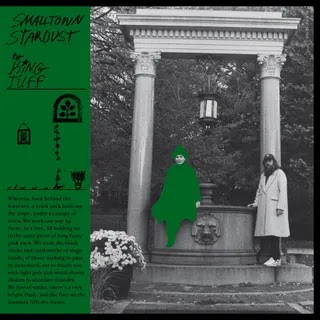Steeped in the warm, psychedelic pop-rock of the 1970s, the new record from erstwhile garage rocker Kyle Thomas is a gold-toned nostalgia voyage that’s never entirely familiar.
Smalltown Stardust reveals the sensitive side to King Tuff, the garage-rock persona Vermont eccentric Kyle Thomas adopted in the late 2000s. Those early King Tuff records—delivered just after Thomas spent some time playing in Witch, the stoner metal group from Dinosaur Jr.’s J Mascis—prized fuzztone and grime, offering cheap, high-octane thrills. Thomas consciously avoids that kind of excitement on Smalltown Stardust, instead wandering down the path he began to carve with 2018’s The Other. Designed as a deliberate reset, a chance to flush the dirtiest elements of garage rock out of his system, The Other nevertheless featured significant contributions from fellow rockers like Ty Segall and Mikal Cronin, inevitably tying it to previous King Tuff albums even if it never sounded as sludgy. Smalltown Stardust represents the true opening of a new chapter, showcasing a gentle troubadour singing songs of nature.
Previous King Tuff albums occasionally suggested the pastoral—see “Evergreen,” from 2012’s King Tuff—but these tender accents effectively highlighted the raucousness of the rest of the record. Here, Thomas strips away the filth from his hooks, relaxing his rhythms while placing melody at the forefront. He doesn’t do this on his lonesome: Smalltown Stardust was written and produced with singer-songwriter and multi-instrumentalist SASAMI, aka Sasami Ashworth. At the start of the pandemic, Ashworth and Hand Habits’ Meg Duffy holed up at Thomas’ home in Los Angeles, a living arrangement that encouraged collaboration. Smalltown Stardust is the third in an informal series that includes SASAMI’s 2022 album Squeeze, co-produced by Thomas, and Fun House, the 2021 Hand Habits record produced by Ashworth and mixed by Thomas. In every meaningful way, Ashworth is on equal ground with Thomas throughout the album, not only providing harmonies but shaping melodies and molding an aesthetic distinct from any other King Tuff record.
The album title hints at Thomas’ grand concept: He’s writing about childhood in his hometown, a time when he felt more deeply connected to nature. Getting back to the garden is hardly a new idea in rock’n’roll and, unabashed revivalist that he is, Thomas reaches for a handful of old records as he plots his own journey through the secret life of plants. There’s a vague Wings wind blowing through this small town: Not only do Thomas and Ashworth’s platonic duets suggest an alternative Wings where Marc Bolan married Linda McCartney, “How I Love” and “Portrait of God” are punctuated by simple, tasteful guitar fills straight out of Paul McCartney’s six-string work on Wild Life, while “The Bandits of Blue Sky” marches to a stately rhythm reminiscent of Ram. Wings aren’t the only 1970s touchstone in play: The cheerful pulse of Thomas and Ashworth’s harmonies on “Tell Me” evoke Lindsey Buckingham and Stevie Nicks.
Recognizing these allusions is part of the fun of Smalltown Stardust—the record is littered with them, including a knowing nod to the Kinks’ Village Green Preservation Society on the title track—but pastiche isn’t the point. The references buttress Thomas’ voyage into a nostalgic, naturalistic past: an ode to childhood animated by favorite sounds of old. Ashworth helps keep Thomas from drifting down memory lane, adding textures and harmonies that sound comforting but not entirely familiar, giving the psychedelic lilt of his melodies space to breathe. Gaze into Smalltown Stardust’s airy arrangements and you might see a reverse image of previous King Tuff records. That was music made for the cold dark of night, or at least a dimly curtained bedroom; this is music made to be heard in the reassuring glow of sunshine.



0 comments:
Post a Comment